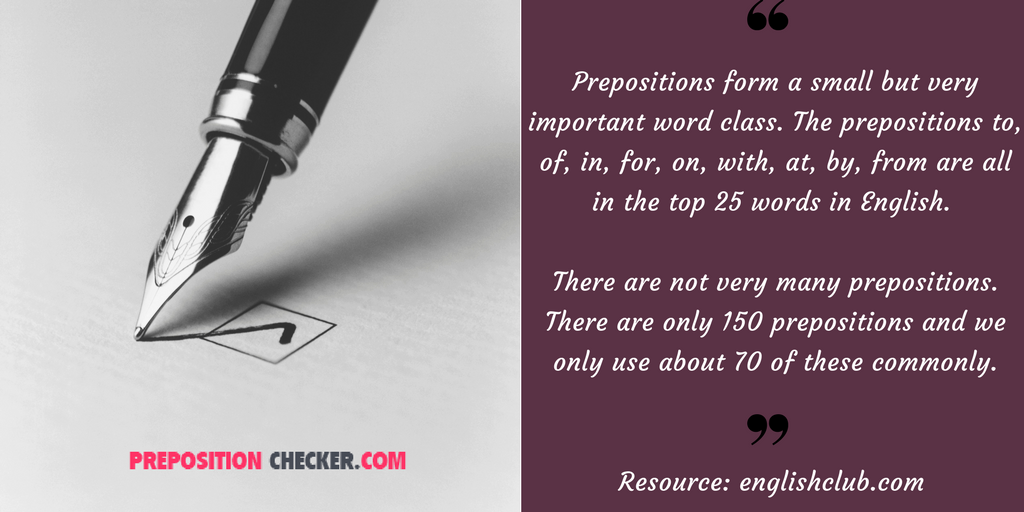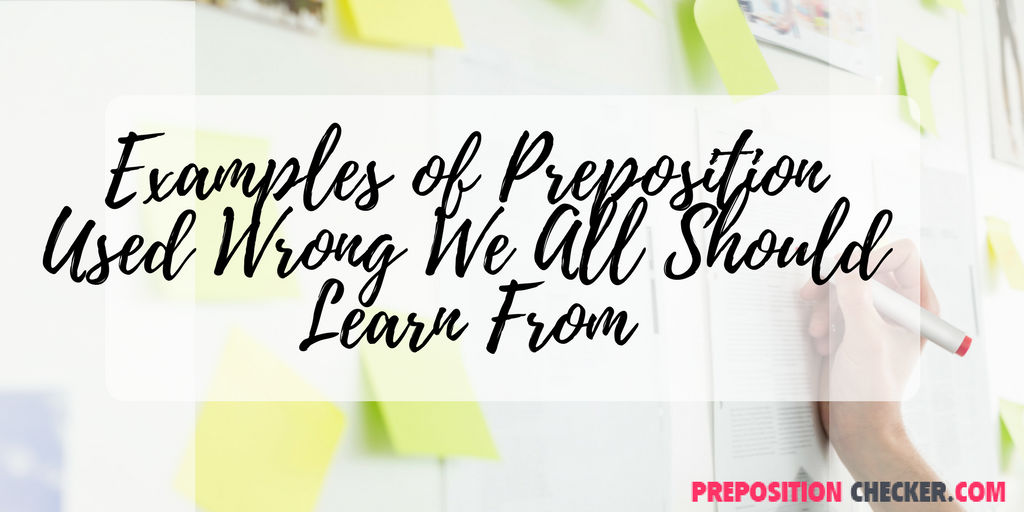When it comes to understanding English grammar prepositions, it’s often just as useful to learn from examples of preposition misuse as it is to examine the rules of how they should be employed. There are so many different ways in which you can learn, and your chosen method depends on your preferred learning style and the particular issues you are facing. You may even get great use out of an expertly developed preposition checker online, but let’s first look at some examples.
Proper Examples of Preposition Significance Usage
There is a wide range of reasons why incorrect preposition usage can have a negative impact on your work, studies or even your personal life. While sometimes people’s unusual preposition usage can be explained by factors such as using British rather than American English, other times there’s no way to describe their choices as anything but incorrect preposition usage.
Take a look at some of the consequences of not knowing the correct usage of preposition words:
- When it comes to the combination of words in a sentence relationship between them is often defined by prepositions. If you’re describing someone’s actions in an everyday situation, you simply can’t do it without prepositions.
- While you’re at work and using prepositions grammar rules are more important than ever. If you use the wrong preposition, you could easily end up saying something directly opposite to what you meant to express.
- Taking advantage of preposition usage examples is crucial if you write for a living. When you’re trying to convey a message to your audience, the wrong preposition can leave your readers totally bewildered.
- You’ll notice from any preposition usage examples that they comprise some of the most common words in the English language. In fact, 9 of the 25 most frequently used words are prepositions.

Easy Examples of Proper Usage of Prepositions
When it comes to certain prepositions grammar rules vary from one country to the next. Famously, American English uses a range of prepositional phrases that modern British English doesn’t employ at all. Before we examine more complicated topics like the pronoun object relationship and other such grammar rules, let’s start gently by exploring the most common reasons for needing a preposition, including an example of preposition in a sentence for each:
- Oftentimes, prepositions are used to indicate the direction of an action. For example, “The rabbit ran around the field”.
- It’s never difficult to find an example of preposition in a sentence describing the location of an action. For example, “The rabbit lived in a field”.
- Prepositions can even be used to indicate the time of an event. For example, “The rabbit was grazing in the field at 12 o’clock”.
- The last of the most common usages for prepositions involves the introduction of an object. “The rabbit is in the kitchen”. Note that this example includes “kitchen” as an object while also indicating the location of the subject, i.e. the rabbit.
Awkwardly Wrong Usage of Prepositions
The examples outlined above are completely correct, but imagine if we changed the prepositions to ones that were totally unfit for the job. Let’s take a look at what happens with the wrong preposition usage for direction, location, time and a few more:
- Instead of describing a rabbit running around a field, we could erroneously say “The rabbit is running at the field”. You could argue that this now speaks of a rabbit running towards a field, but it’s really not correct at all. It just sounds wrong.
- Rather than speaking about the rabbit’s location as “in a field”, what if we said, “The rabbit lives through a field”? While this might partially describe the fact that we would have to do walk through a field to get to the rabbit hole in question, this incorrect sentence really isn’t a sufficient way of expressing this thought.
- Learning how to tell the time and explain to your interlocutor when an event is to take place are lessons that are covered pretty early on in your English education. If we started saying “The rabbit is eating on 12 o’clock”, even a young child would notice this is wrong.
- When you’re introducing an object in a given sentence, you have to be incredibly careful about which preposition you use. The results of the wrong usage can vary from the creation of a nonsensical sentence to the production of a sentence that means quite the opposite to what you intended. For example, “The rabbit is under the kitchen” evokes a colorful image but is ultimately incorrect.

The Ultimate List of Wrongly Used Prepositions
The quickest way to see how a preposition should be used is to check out some examples of preposition words used improperly. Our grammar geniuses have pulled together the 15 most commonly misused prepositions, and you’ll find all these examples of preposition words right here. What’s more, you’ll benefit from a simple and straightforward guide to correct usage of preposition terms:
- “Able with”. Many languages express capability in this way, but English certainly doesn’t. In English, this wrong usage suggests some kind of link to ability, but it doesn’t get the point across at all. Instead, you need to say, “able to” alongside an infinitive verb.
- “Capable to”. Given the use of “able to”, many students assume that the same is possible with “capable”. However, this word has more to do with your inherent capacity to perform an action, meaning that you possess this ability. Hence, the correct form is “capable of”.
- “Concerned with”. Plenty of native speakers make mistakes when “concerned” is involved. You can use a range of prepositions here to express various meanings, but you typically ought to use “concerned by” if you’re talking about being worried.
- “Prohibited to”. It’s all too easy to make a mistake with this one. While you can say that “It is prohibited to smoke here” in a passive sense, it doesn’t work when you’re talking more actively about a subject. For example, you must say “We are prohibited from smoking here”.
- “Turned” can be used without a preposition to indicate the act of rotating something, but it’s totally wrong to talk about using electronic devices in this way. If you say you “turned the television”, you give the impression that you physically turned the box around. Instead, you need to say you “turned the television on”.
- Some people still say that it’s a mistake to finish a sentence with a preposition, but this is actually completely false. This erroneous practice was suggested in the Victorian era in an attempt to make English sound more like Latin. However, it’s totally natural to finish a sentence with a preposition, and you’ll hear English speakers doing it all the time.
- “Could of”. So many native speakers make this mistake, but it’s much less commonly observed in those who speak English as a second language. This error first arose because “of” sounds like “have” when spoken quickly. As you must have just guessed, the correct form is “could have”.
- “Jumped in to”. When we are talking about someone jumping to a new location, it’s wrong to suggest they “jumped in to”. Although it sounds fine in speech, “into” is a completely separate preposition from “in to”. Therefore, make sure you write “jumped into”.
- “Different than”. This is a controversial one as it makes up one of most common differences between British and American English. Be aware that while Americans will happily use “different than” and “different to”, British speakers will almost exclusively use “different from”.
- “Since hours”. In many languages, the words for “since” and “for” are the same when used to describe time. However, English makes a distinction between the duration of a particular action and the time that has passed since a previous action. That’s why you can say “We have been walking for hours”, but you cannot say “We have been walking since hours”.
- “Used up to”. This is another mistake that stems from grammatical choices made in other languages. It’s possible to say, “up to” or “until” in the sense of an approximation in some tongues, but English is not one of them. If you’re guessing an amount used in a recipe, you ought to say, “used around”.
- “Arrived to”. Here’s a common mistake that’s easy to fall into the habit of making. However, you can only “arrive at”.
- “Located in”. When discussing an address or location, you must say that it is “located at”. Otherwise, it marks you out as a non-native speaker or a poorly educated native speaker right away.
- “Found at”. Contrary to the previous example, you cannot use “at” when talking about larger locations like a whole country. That’s why it’s correct to say, “The tastiest sausages are found in Germany”.
- “I am go run”. While you can string verbs like this together in rare and very informal cases, it’s not really correct at all. Instead, you are “going running” or you will “go running”.
Expert Help from Those in the Know
Sometimes, it’s better to seek the advice of an expert preposition checker online rather than relying on yourself to quickly unlearn mistakes you’ve been making for years. With the help of our team of professionals and their clever tools, correct preposition checking doesn’t take up very much time at all. Consider the top features of each and every one of our experts before you get rid of your wrong preposition usage forever:
- Making the most of an online preposition checker saves you so much time and energy. There’s no need to worry about your mistakes when an expert is on hand to fix them.
- You stand to learn plenty from correct preposition checking. If you’re looking to improve your English grammar, this is the way to do it.
- Whether you need a word of advice or a complete overhaul of your work, professional editors get the job done quickly and efficiently.
- All our examples are original and specially developed just for you. Expect a personalized approach that addresses your unique concerns head-on.
Boost Your English with Professional Preposition Support
You can learn plenty from reading through a range of examples of preposition misuse, but you can discover even more when you speak to a genuine expert. Our language professionals have developed the best tools and methods to show you how to write proper English whether you’re struggling at work while studying, or even in your daily life. Get in touch with a top advisor and learn what it takes to be the best communicator.
Make the most of examples of preposition misuse. Learn from other people’s mistakes and boost your own performance!










